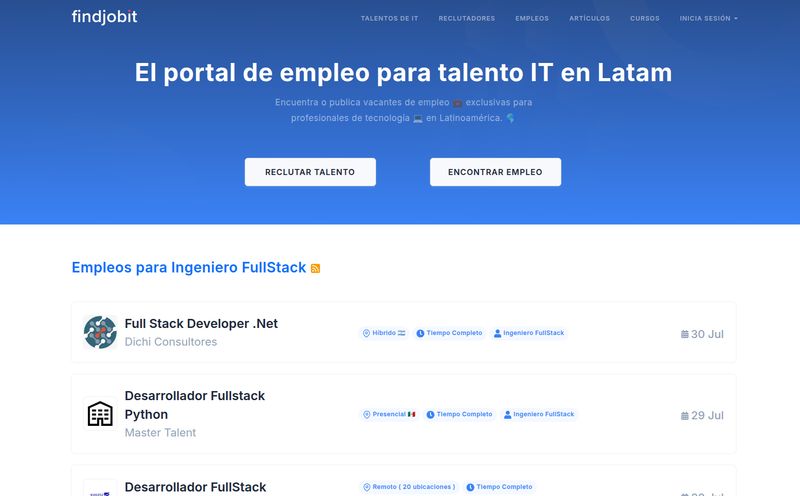I’ve been in the web development and SEO game long enough to remember when finding good documentation felt like panning for gold in a river of outdated Stack Overflow threads. You’d find a promising solution, only to realize it was for a version of a framework that went extinct three years ago. Frustrating, right? Especially with a beast like Angular, where the learning curve can sometimes feel more like a learning cliff.
For years, angular.io was our home base. It was... fine. It did the job. But it never felt particularly inspiring. So when the team announced a move to a brand-new domain, Angular.dev, I was cautiously optimistic. Is this just a new coat of paint, or is it a fundamental rethink of how developers learn and build with Angular?
Well, I’ve spent some serious time poking around the new site, and let me tell you, it’s more than just a new URL. It’s a whole new philosophy.
So, What Exactly is This Angular.dev Thing?
At its core, Angular.dev is the new official home for all things Angular. It’s a one-stop-shop straight from the source—the Google team behind the framework. This isn't some third-party tutorial site or a fan-run wiki. This is the place. It consolidates everything: in-depth documentation, hands-on tutorials, API references, and community links into one, slick package.
The first thing you’ll notice is the clean, modern feel. It’s fast. It’s intuitive. It feels less like a dusty library and more like a modern, collaborative workspace. They’re not just presenting information; they're creating an environment for learning and experimentation. A small but significant detail I noticed in the footer is the CC-BY 4.0 License. It speaks to a commitment to open access and sharing, which is always great to see.
A Quick Tour of the New Neighborhood
I took a spin through the main sections, and a few things really stood out to me. It's not just about what's there, but how it's presented.
The Documentation Finally Feels Approachable
The old docs could be a bit dense. You knew the answer was in there somewhere, but finding it required a bit of a treasure hunt. The new docs on Angular.dev are structured more like a story. They guide you from the foundational concepts to more advanced topics with a logical flow. And they’re constantly updated. As I’m writing this, there's a banner at the top announcing the release of Angular v18 and new resources for using AI with Angular. That's timely and incredibly relevant.
The Interactive Playground is a Godsend
This might be my favorite feature. The Playground is an in-browser sandbox where you can write and run Angular code without setting up a single thing on your local machine. This is huge! You can test a small snippet of code, try out a new feature, or work through a tutorial example right on the page. It lowers the barrier to entry so dramatically. No more `ng new` and waiting for dependencies to install just to see if a simple binding works. It’s like having a little Angular lab right in your browser. Just brilliant.

Visit Angular.dev
Learning Paths for Everyone (Yes, Even You, Absolute Beginner)
Okay, let's be real. Angular has a reputation. Some might argue it's tough for newcomers, and historically, they wouldn't be wrong. Angular.dev seems to be tackling this head-on. The tutorials are designed as learning paths that cater to different needs. Whether you're building your very first component or trying to understand advanced dependency injection patterns, there's a guided path for you. It’s a much more intentional approach than just throwing a pile of documents at you and saying “Good luck!”
Let's Get Real: Who Is This For?
So who benefits most from this new platform? Is it just for the hardcore enterprise developers? In my opinion, its reach is much broader now. I've thrown together a quick table with my two cents.
| Developer Level | How Angular.dev Helps | My Take |
|---|---|---|
| Beginner | Structured tutorials, "Getting Started" guide, interactive playground for safe practice. | It can still feel a bit like drinking from a firehose, but the foundational content is solid. If you start here, you're on the right track. |
| Intermediate | Deep-dive guides on topics like routing and state management, API references, and best practices. | This is the sweet spot. You'll find clear answers to those 'how do I architect this properly?' questions that plague mid-level devs. |
| Expert | Advanced concept explanations, contribution guides, and immediate access to the latest release notes. | This is your new command center. You'll probably have the API reference and release notes permanently open in a tab. |
The main advantage, no matter your level, is that it's the official, canonical source. The web development world moves fast, and having a single source of truth is invaluable. When you compare it to the ecosystems of, say, React or Vue.js, which have fantastic communities but sometimes fragmented documentation, having this unified hub is a distinct advantage for Angular.
And The Price Tag Is...
So what's the catch? All these features, the interactive playground, the updated guides... this has to cost something, right?
Nope. It's completely free. Zero cost. It's an open-source framework backed by Google, and the resources to learn it are provided freely to the community. In an age of endless subscriptions, that’s incredibly refreshing. It lowers the barrier for developers in all corners of the world to pick up a powerful, in-demand skill.
Frequently Asked Questions (FAQs)
I've seen a few questions pop up since the launch, so let's tackle them head-on.
What is Angular.dev?
Angular.dev is the new official website and documentation platform for the Angular framework, developed by Google. It replaces the old angular.io site and provides comprehensive tutorials, documentation, API references, and an interactive coding playground.
Is Angular.dev free to use?
Yes, completely free. All the resources, including the tutorials and the interactive playground, are available at no cost. The project is open-source and dedicated to the developer community.
Is Angular.dev a good resource for beginners?
Absolutely. While Angular itself has a learning curve, Angular.dev is designed to be much more beginner-friendly than its predecessor. The guided learning paths and the interactive playground make it one of the best places to start learning Angular today.
So what happened to the old angular.io site?
The angular.io domain now redirects to Angular.dev. The move represents a rebranding and a significant upgrade in the platform’s technology and user experience, consolidating everything into a new, modern home.
What's new in the latest version of Angular?
The latest version, Angular v18, introduced some exciting features, including built-in prompts and best practices for integrating AI into your applications, zoneless change detection for better performance, and other improvements. The Angular.dev homepage usually has the latest scoop!
Can I contribute to the platform?
Yes! Angular is an open-source project, and the community is a huge part of its success. The site provides links and information on how you can contribute, whether it's by improving documentation, reporting bugs, or contributing to the code.
Final Thoughts
Look, a documentation website is rarely something to get excited about. It’s a tool, a utility. But I genuinly think Angular.dev is different. It’s a well-thought-out, powerful, and dare I say, enjoyable platform to use.
It shows a real commitment from the Angular team to not only maintain the framework but to nurture the community around it. It smooths out so many of the rough edges that used to make getting started with Angular a bit of a chore. Whether you’re a seasoned pro who has been with Angular since the AngularJS days or a curious newcomer wondering what all the fuss is about, Angular.dev feels less like a manual and more like a partner in your corner. Honestly, it's worth a visit just to experience how good documentation can be.
Reference and Sources
- The new official Angular website: https://angular.dev/
- Creative Commons BY 4.0 License: https://creativecommons.org/licenses/by/4.0/
- Official React Documentation: https://react.dev/
- Official Vue.js Documentation: https://vuejs.org/guide/introduction.html



